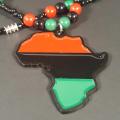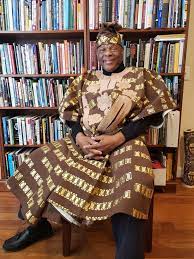137. Asante Sana: Molefi Asante’s Afrocentricity
What inspired Asante's philosophy of Afrocentricity, and its relationship to religion, nationalism, and feminism.
Themes:
• M.K. Asante, Afrocentricity: The Theory of Social Change (Buffalo: 1980).
• M.K. Asante, The Afrocentric Idea (Philadelphia: 1987).
• M.K. Asante, Afrocentricity (Trenton: 1988).
• M.K. Asante, Kemet, Afrocentricity, and Knowledge (Trenton: 1990).
• M.K. Asante, Malcolm X as Cultural Hero and Other Afrocentric Essays (Trenton: 1993).
• M.K. Asante, The Egyptian Philosophers: Ancient African Voices from Imhotep to Akhenaten (Chicago: 2000).
• M.K. Asante, Afrocentricity: The Theory of Social Change, revised and expanded ed. (Chicago: 2003).
• M.K. Asante, An Afrocentric Manifesto: Toward an African Renaissance (Cambridge: 2007).
• D.D. Turner, "An Oral History Interview: Molefi Kete Asante," Journal of Black Studies 32 (2002): 711-734.
***
• M. Ani, Yurugu: An Afrikan-Centered Critique of European Cultural Thought and Behavior (Trenton: 1994).
• M.K. Asante (1981-), Buck: A Memoir (New York: 2013).
• P.H. Collins, "The Social Construction of Black Feminist Thought," Signs 14 (1989): 745-773.
• F.C. Welsing, The Isis Papers: The Keys to the Colors (Chicago: 1991).
• E.F. White, "Africa on My Mind: Gender, Counter Discourse, and African-American Nationalism," Journal of Women’s History 2 (1990): 73-97.






Comments
Podcast uploading schedule
Shouldn't today have been a Western history of philosophy episode, instead of an Africana one?
In reply to Podcast uploading schedule by Andrew
Schedule
No, though I can see why you'd think that! With this one we are actually back on schedule, the previous Africana one was late which is why we had two Africana ones appearing in sequence. Kind of made sense though because 136 and 137 are sort of a two-part look at African centered thought. Next week (Dec 24, Xmas Eve!) we'll have the next installment from the British Renaissance.
Phobia
I know it is the dominant term, but is there a better term for "homophobia" than the one you used here that you could substitute for the book release? I ask because,
A: It is a misnomer as there is very little support for it being motivated by fear in the way phobias are (as far as i could find)
B: Even if I am wrong about A, I would still think there is a serious distinction between those who felt uneasy around homosexuals but views that as their own failing, vs someone who felt uneasy around homosexuals and uses it as an excuse to hate said homosexuals.
C: It seems unethical to me to lump in those with a possibly debilitating mental illness together with whose views are just bigoted as "phobes", especially when some of those people with said illness may already be at a significant societal disadvantage
In reply to Phobia by Alexander Johnson
Homophobia
Yes, it is not ideal that the world settled on this term for prejudice against gay people. But I don't really think people hear the "phobia" part in the word anymore, it is not a live connotation anymore. (Like, I don't think Greeks necessarily thought about being blessed by the spirits when they used the word "eudaimonia," they just thought about happiness.) So I tend to think it would be overly persnickety to insist on using some other term or paraphrase. There is also something to like about the word, which is that it is strongly pejorative and it is good for progress that we have a word, however unfortunate its formation, that explicitly refers to this phenomenon in a disapproving way instead of having to talk around it by saying something like "prejudice on the grounds of sexual orientation."
In reply to Phobia by Alexander Johnson
I agree with Peter--the "…
I agree with Peter--the "-phobia" suffix doesn't always denote fear in English, as seen in a wide array of words describing various prejudices/aversions (Islamophobia, transphobia, etc.). It shows up in scientific terms unrelated to fear as well, as with "hydrophobic" (water-repelling) molecules. So it looks like it functions as just an antonym of "-philia": the opposite of a Francophile is a Francophobe and so on.
Add new comment